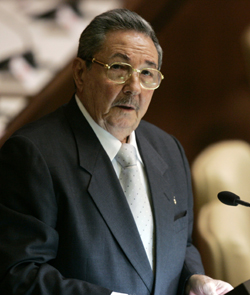Cuba's new leader promises change to make the country stronger
(Xinhua)
Updated: 2008-02-25 23:52
Updated: 2008-02-25 23:52
HAVANA - Cuba's newly-elected President Raul Castro said Sunday that he would bring about changes in the country to make its government more efficient and economy stronger.
 Raul Castro addresses the audience after being elected president of Cuba during a meeting of the National Assembly in Havana February 24, 2008. [Agencies]
|
In his first address as president to Cuba's legislature, the National Assembly of People's Power (ANPP), Raul said the country needs "a smaller number of central administration bodies and a better distribution of their functions."
"We have to make our government more efficient," he said in the speech after being unanimously elected by Cuban lawmakers to succeed his elder brother Fidel as the country's leader.
He also said the government will focus on satisfying citizens' basic needs "both spiritual and material, starting by boosting sustained economic growth."
Local media said the new leader also indicated that he was reviewing the possibility of a gradual reevaluation of the Cuban peso and some "small restrictions" on Cuba's economic system could be removed in the coming weeks.
Raul also pledged to loosen control over some social activities.
"We must not fear disagreement in a society like ours, in which due to its very essence there are no antagonistic contradictions because there are no social classes that create such things," he said.
Raul has headed Cuba's caretaker government for 19 months, after Fidel needed emergency intestinal surgery and provisionally ceded power in July 2006.
Fidel announced on February 19 that he would retire as Cuba's leader, after nearly 50 years in power. However, the 81-year-old retired leader pledged to continue communicating his thoughts to the Cuban people through media articles.
Despite the promises of change, Raul emphasized that he would take on the legacy of his elder brother and consult him on "decisions of fundamental importance for the nation's future, including defense, foreign policy and socio-economic development."
"Fidel is irreplaceable and the people will continue his work even when he is not physically here, because his ideas will always be present," Raul said.
He said he would be on guard against any US "meddling" in Cuba's internal affairs, after several US presidential candidates cried for change in Cuba days ago.
Raul, who served as Cuba's defense minister before the election, also found himself a successor, Julio Casas Reguiero, who previously served as first vice minister of the Revolutionary Armed Forces and No. 2 in the Defense Ministry.
Apart from the new president and defense minister, Cuba also embraces a new Council of State, a 31-strong body that will make the most important decisions in Cuba in the next five years.
|
|
|
||
|
||
|
|
|
|